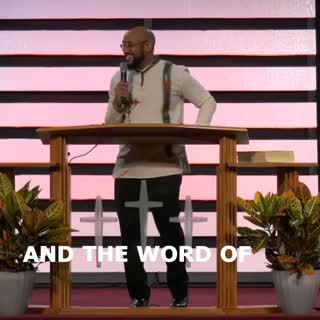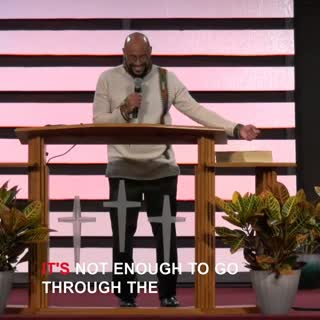Transformative Trials: Job's Journey to Divine Restoration
Devotional
Sermon Summary
Bible Study Guide
Sermon Clips
And the word of the Lord reads, Now the Lord blessed the latter days of Job more than his beginning. Let me read that one more again. Now the Lord blessed the latter days of Job more than he blessed his beginning. One more time. And now the Lord blessed the latter days of Job. Job more than his beginning. Amen. How to keep your faith when life seems unfair. The Lord blesses the latter days. You may be seated. Amen. Amen. [00:00:19] (63 seconds)
God will deal with us before he starts dealing with stuff. I know we cried about it. I know we were honest to God, just like Job, about what was bothering us. I know we cast all of our cares upon the Lord. But I've got some news from you. Most often, God deals with us prior to addressing what's bothering us. God deals with you before God addresses what's bothering you, stressing you, nagging you. God addresses you before addressing your enemies and your frenemies. God starts working with you before he starts working on folk who wronged you. [00:04:54] (47 seconds)
You heard the preacher say, God is a deliverer, but until you've been in bondage yourself and you see God break off the shackles, you have not seen God as a deliverer. You heard he was Jehovah Jireh, your provider. But until your bank account has insufficient funds, you're watching me tell you what happened to my soul. I gave him money, I gave him bread, you get the past due notice from the light company until you don't know how you're going to pay the rent and God shows up and makes it happen you have heard it but you ain't seen it yet [00:09:10] (41 seconds)
Job is making it clear that it is about seeing God now not hearing God from what you have heard in the past. It's good. You need to hear about God. You go to Sunday school to hear about God. You show up on Sunday mornings to hear about God but when you leave the church that's when you begin to seek God. See, see, see, see you take what you heard with you to work. You take what you heard with you to your family. You take what you heard with you into the community. You take what you heard with you on the social media. You take what you heard with you into the marketplace and then God shows up so you can see. [00:12:04] (43 seconds)
Job the one who has been the biggest victim through this entire ordeal is then called to minister to the very ones who were unable to minister to him and if that wasn't enough there is a deeper problem in the text Job had not been restored yet he's still sick pray for your friend although your change still hasn't happened you you are missing what's happening with your Job can you pray for them when I still haven't answered [00:28:46] (64 seconds)
Your trials and tribulations can you minister to the ones who neglected you but now have repented hearts even though your circumstance and situation has not changed joe can you follow the assignment that i'm giving you even though your body's still aching and there's grief still in your heart even this deliverance process doesn't seem fair job has repented and the first thing god does in addressing job's friends is have him to worship with them and pray over them can you pray for people who have wronged you but now have a repentant heart towards god can you serve the lord and remain faithful to your assembly assignment while still awaiting god's deliverance [00:28:46] (59 seconds)
It's not enough to go through the motions. Your heart has to be right and God will take us through position after position, situation after situation to reveal for our own good the things that are lurking in the shadows of the chambers of our heart. Verse 10. It's one of my favorite verses in this entire book because it tells us that when Job began to pray for his friends, the Lord restored Job's losses. [00:32:19] (46 seconds)
The restoration of Job was tied to his ability to pray for his frenemies. Oh, my Lord. Job's deliverance. Job's breakthrough it was all tied to how he could minister to the very ones that were a part of his brokenness oh my lord which means if job never got to a place where he could grow in god to follow through on the assignment that god had given him then job would have never realized his deliverance because god does not tell you everything about what you're getting ready to do and how it's interconnected [00:33:15] (52 seconds)
as Job prayed God restored Job's losses and not only did he restore it the text says he gave him double of everything that he lost in other words god gave him double for his trouble god gave him more than he even asked for because god would do exceedingly abundantly abundantly above all you ask or think it was as he prayed for others that he realized give and it shall be given unto you a good measure pressed down shaken together running over shall be poured into your life for with the measure you use it will be measured back unto you [00:35:35] (68 seconds)
Ask a question about this sermon
God will deal with us before he starts dealing with stuff. I know we cried about it. I know we were honest to God, just like Job, about what was bothering us. I know we cast all of our cares upon the Lord. But I've got some news from you. Most often, God deals with us prior to addressing what's bothering us. God deals with you before God addresses what's bothering you, stressing you, nagging you. God addresses you before addressing your enemies and your frenemies. God starts working with you before he starts working on folk who wronged you. [00:04:54] (47 seconds)
You heard the preacher say, God is a deliverer, but until you've been in bondage yourself and you see God break off the shackles, you have not seen God as a deliverer. You heard he was Jehovah Jireh, your provider. But until your bank account has insufficient funds, you're watching me tell you what happened to my soul. I gave him money, I gave him bread, you get the past due notice from the light company until you don't know how you're going to pay the rent and God shows up and makes it happen you have heard it but you ain't seen it yet [00:09:10] (41 seconds)
Job is making it clear that it is about seeing God now not hearing God from what you have heard in the past. It's good. You need to hear about God. You go to Sunday school to hear about God. You show up on Sunday mornings to hear about God but when you leave the church that's when you begin to seek God. See, see, see, see you take what you heard with you to work. You take what you heard with you to your family. You take what you heard with you into the community. You take what you heard with you on the social media. You take what you heard with you into the marketplace and then God shows up so you can see. [00:12:04] (43 seconds)
Job the one who has been the biggest victim through this entire ordeal is then called to minister to the very ones who were unable to minister to him and if that wasn't enough there is a deeper problem in the text Job had not been restored yet he's still sick pray for your friend although your change still hasn't happened you you are missing what's happening with your Job can you pray for them when I still haven't answered [00:28:46] (64 seconds)
Your trials and tribulations can you minister to the ones who neglected you but now have repented hearts even though your circumstance and situation has not changed joe can you follow the assignment that i'm giving you even though your body's still aching and there's grief still in your heart even this deliverance process doesn't seem fair job has repented and the first thing god does in addressing job's friends is have him to worship with them and pray over them can you pray for people who have wronged you but now have a repentant heart towards god can you serve the lord and remain faithful to your assembly assignment while still awaiting god's deliverance [00:28:46] (59 seconds)
It's not enough to go through the motions. Your heart has to be right and God will take us through position after position, situation after situation to reveal for our own good the things that are lurking in the shadows of the chambers of our heart. Verse 10. It's one of my favorite verses in this entire book because it tells us that when Job began to pray for his friends, the Lord restored Job's losses. [00:32:19] (46 seconds)
The restoration of Job was tied to his ability to pray for his frenemies. Oh, my Lord. Job's deliverance. Job's breakthrough it was all tied to how he could minister to the very ones that were a part of his brokenness oh my lord which means if job never got to a place where he could grow in god to follow through on the assignment that god had given him then job would have never realized his deliverance because god does not tell you everything about what you're getting ready to do and how it's interconnected [00:33:15] (52 seconds)
as Job prayed God restored Job's losses and not only did he restore it the text says he gave him double of everything that he lost in other words god gave him double for his trouble god gave him more than he even asked for because god would do exceedingly abundantly abundantly above all you ask or think it was as he prayed for others that he realized give and it shall be given unto you a good measure pressed down shaken together running over shall be poured into your life for with the measure you use it will be measured back unto you [00:35:35] (68 seconds)


















